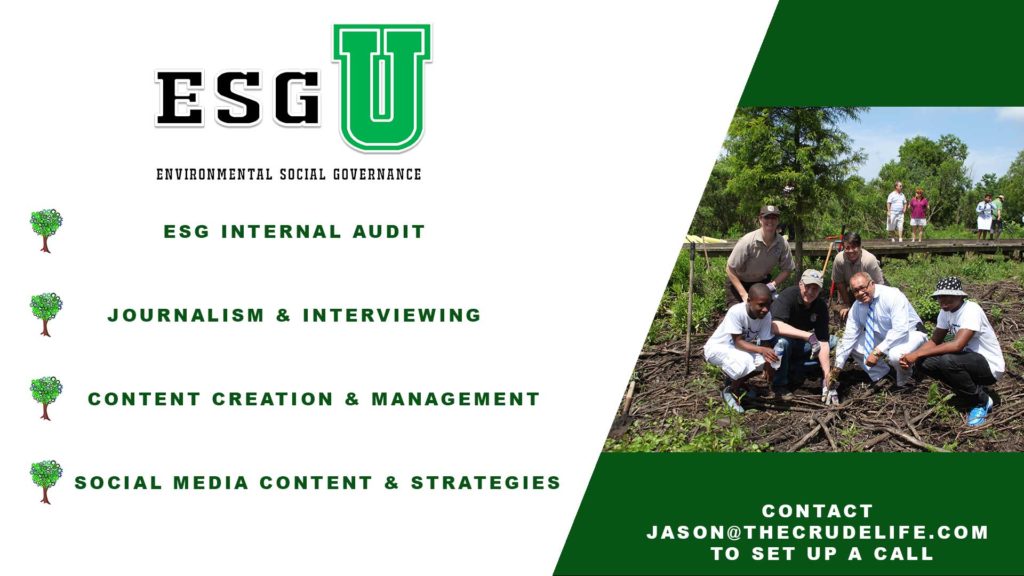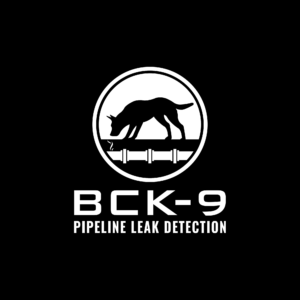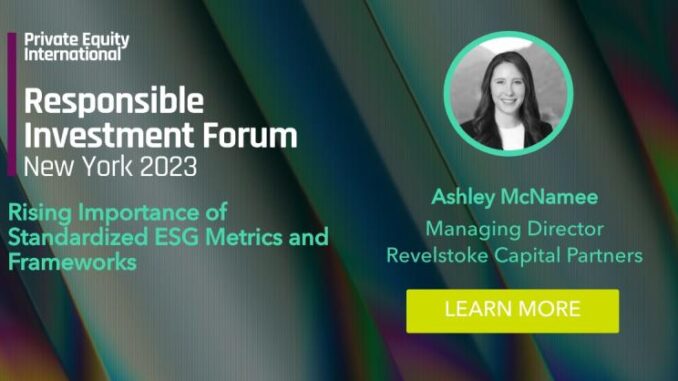

Every March since 1987, Congress and U.S. Presidents have designated March as Women’s History Month. This year, The Crude Life celebrates and honors their accomplishments and contributions in history with interviews and stories that center around women’s experiences in industry.
The Crude Life believes women are vital in energy. Today more than ever. From a female’s point of view to intuition to specific skill sets, women are vital in energy.
Today’s women in industry are not only modern-day leaders, but truly are defining history as well.
Everyone at The Crude Life is grateful for all your contributions to industry, to your communities and to our planet.
Here is a fantastic interview with Ashley McNamee, Director, ESG Services at Revelstoke Capital Partners, gives an overview of what ESG is and why oil and gas companies are starting to integrate into their business plans, share holder reports and general practices.
McNamee, who is a former television news anchor and oil and gas executive, brings a unique perspective to the ESG industry. Her media background creates a 5000-foot perspective very few in oil and gas possess due to pedigree.
In addition her work for Whiting Petroleum opened her eyes to the realities of environmental innovations oil and industrial integrity.
These experiences have paved a new path of McNamee in ESG audits, framework creation and environmental investment navigation.
McNamee also talk about Women’s History Month and how the oil and gas industry has made incredible changes over the past decade.
BIG BIG BIG Thank You to The Industrial Forest for sponsoring Women’s History Month at The Crude Life, this will enable a different female to be featured everyday in the month of March.
Ashley McNamee: Ashley McNamee, Alvarez Marcel.
Jason Spiess: Thank you for joining the program here today. We’re— All month long, we’re going to be doing, uh, ESG, environmentally friendly, environmental innovation, industrial integrity as well, when it comes to the world of oil and gas and energy and just the whole, I guess, energy gamut, if you will. Uh, Ashley McNamee is our guest today. How are you doing?
Ashley McNamee: I’m doing well, how are you?
Jason Spiess: Excellent and thank you for joining the program here today. Before we get into, you know, the-the eco world and the investments and when it comes to just this whole new, uh, approach to energy, uh, we’re sunsetting, if you will, because technically, we are still in March as we’re recording this, even though it’s going to air in April in a couple days. Uh, we’re-we’re finishing up Women’s History Month and you’re a female and you’ve worked in the oil and gas industry now for about ten years? Ten, twelve years?
Ashley McNamee: Uh, no, it’s been about seven or eight.
Jason Spiess: Oh, seven or eight, okay. But you came from media, so—
Ashley McNamee: Yeah.
Jason Spiess: Uh, yeah, the reason I wanted to bring it and bring that up is that, technically, you’ve kind of blazed the trail a little bit, because media you were technically a trailblazer when it came to females being a news anchor and just solidifying that role in television. And then also in the world of, uh, oil and gas, I think, personally, any woman working in oil and gas right now is writing history as we speak, because traditionally there’s only been just a handful. So, as we define the new world of energy right now, boy, it’s, there’s all kinds of females just carving their own path in the world of energy. So, uh, with your background in media and your background in energy talk to me a little bit about, just, females, their contributions, and how you view, uh, women when it comes to industry.
Ashley McNamee: Sure, yeah. Oil and gas has always been so unique and one thing I do appreciate about it – although I do have a college degree – is it’s still one of the industries and fields where, I think, how hard you work determines how well you do. Um, so you are starting to see, um, actually over the last probably five to ten years, folks from really diverse backgrounds being brought into the industry. So, whether it’s a tech background or finance or in my case media and journalism, um, the diversity of knowledge that’s come into the industry, I think, is really is what helped change, um, like significant parts of it. Um, so, for instance, when I left news to come join Whiting Petroleum back in 2014, uh, the impetus for that was the ballot initiatives in Colorado that were trying to begin, you know, setbacks and sort of de facto regulations on the oil and gas and just— And the company’s idea was to get someone from the media to do for industry what the media had been doing against it. And so, um, came into Whiting and there really wasn’t a lot of infrastructure in terms of internal and external communications, community relations, and then eventually what turned into ESG. So, I guess, to your point, when it didn’t exist, it was pretty, um, okay to come in and leadership – our CEO at the time, Jim Voelker – was reminded and really let us run with it, build an entire department around those things. And, uh, today, it’s not only an entire department, it’s an entire career, and now I’m doing ESG full-time for Alvarez Marcel, so it is evolving daily. Um, but yeah, there’s definitely opportunities for not only all genders but definitely all backgrounds, I think, in our industry today.
Jason Spiess: ESG, environmental social governance, uh, just a very quick definition of what that is for energy companies out there that might be listening and have heard that term and maybe even kind of know what it is a little bit. But what’s the short version of what it is?
Ashley McNamee: Yeah, so, ESG, as you said, stands for environmental, social, and governance and the real crux of it is around disclosures. So, it started probably ten years ago, meaningfully, where investors and different groups, perhaps from the left or the environmental side, were encouraging and requesting more information from any public company in terms of how their operations or company impacts both the environment society and/or how their governance structures, um, play a part in that. So, um, yeah, ESG is basically disclosing your performance in those areas, and as it’s evolved, it’s becoming more formalized. There are frameworks to put them through and, um, potentially even a regulation coming in terms of what ESG will look like and how you will disclose in what metrics.
Jason Spiess: For me, it’s been interesting to watch Meridian Energy Group, with the refinery out there, come at it from a science side, from the bending of pipes to the different coatings that can come onto the automatic sensors. So, there’s a whole, you know, there’s a science side to this ESG part, and, but there’s also, you know, the public relations side of things, too, and I wanted to start with that before we get into maybe some of the science side of things. Uh, to me, I think it’s a whole different ball game that the energy industry has not quite grasped yet in terms of what they’re dealing with. You’ve got a media background a little bit. You and I have talked a little bit about the 5,000-foot view when it comes to that kind of existential public relations and energy. Talk to me about how the awareness and the transparency in the public relations folds into this whole ESG, whether it’s from an investment standpoint, a shareholder standpoint, or just regulation standpoint.
Ashley McNamee: Sure. So actually, you are on the money. Uh, back in 2014 and ’15, when we first started approaching our management team at Whiting, our reasoning for wanting to engage in ESG is that we had great stories to tell and we were looking around and starting to see, you know, the tech sector and even some of the larger oil and gas companies engage in ESG – or back then, we even called it sustainability reporting – and as we were looking at it, it was like, well, we have stories that are as or better than that, so why don’t we start to tell ours as well? And it really has worked to our advantage. Um, the industry, as we all know, it’s no big secret, has not been great at public relations or promoting all the good work it’s done for decades, and so it is a little bit of a catch-up game. But the truth of the matter is, there are so many good things happening and the industry, as it has done with hydraulic fracturing and other things, is so innovative and it will continue to fix its own problems. So, if you look at society, you say climate change, carbon methane emissions, all of these big themes, uh, are really what the public is focused in on when it turned, uh, when it comes to oil and gas, and you already have the majors who, for years now, have been developing their own carbon capture technology. Uh, we didn’t know about it until very recently, necessarily, but the fact that they’re already ahead of that and end up getting is just another good example of how the energy always comes to its own rescue and it will fix its own problems basically. So, the public relations piece is certainly a big opportunity within ESG, but certainly stakeholder relations and investor relations is the other big piece. So, at Whiting, when we started publishing information on our website, at first, we spoke with our investors and they really wanted an actual formalized ESG report, uh, one that they could download and keep on their desk and reference as they were covering the company, and so we were able to provide that for several years and the feedback we received from our investors was overwhelmingly positive. They were just happy that we were being transparent, happy that we were engaging in these disclosures and, uh, really no negative criticism came from our, you know, foray and ESG and our attempt again to be more open.
Jason Spiess: You mentioned the word transparency and that was the next question, where really, you know, a lot of people were very concerned about ESG. They were scared of ESG. Some people are still resisting ESG, when really, at the end of the day, if you’re a responsible company, in my opinion, all they’re asking for really is just a little bit of transparency. Meaning that, you know, if you say you are recycling, well, okay, put that in your recycling report then, you know, type of thing. So, they’re just— To me, this is really kind of an evolution of transparency, and I think personally that it’s an easy embrace for this if you’re already demonstrating these types of things. What types of, uh, pushback, what obstacles, hurdles, objections have you heard from, you know, your colleagues and-and from people in the energy industry when it comes to the whole ESG acceptance or this movement, if you will?
Ashley McNamee: Sure, um, it certainly was more prevalent as it was getting going, so back in 2015 through maybe 2017. But, um, it does feel unnatural to the oil and gas industry to be so public and to be so forthright with telling our stories and, um, really getting ourselves out there in that sense, or at least in some cases. And the big concern we always heard was that we were giving the other side the information they would need to try to put us out of business, and the truth of it is most of the things that you would be disclosing through your ESG reporting and the technical metrics are publicly available information. So, it is things that people can go and find, if they know how, today, whether or not you’re putting it in an ESG report or published on your website. So, the data is out there. What-what ESG really allows you to do is get credit for the things that the company is doing well that may or may not be public. So, say you have, um, a great diversity and inclusion policy. The company is expanding its, um, you know, recruitment of people of color or women or any sort of, um, diverse-diversity of, uh, experience. All of that are things that maybe aren’t public and that are great things for the industry to promote and stories to tell. And so, the key to ESG is to consistently improve, and year over year, if you can go change and show augmentation and the reporting that you guys are completing, it really is a benefit. And so, um, we would say that, you know, ESG isn’t giving people the information about a business. It’s actually providing the information to show how advanced and, um, sophisticated the companies really are.
Jason Spiess: I think another obstacle that a lot of people in oil and gas are kind of graspling right now – and I think I just made that word up – or kind of are, kind of finagling with or whatever is, uh, when they hear the word ESG, they automatically think of the environment. They think of climate change. They think of climate activism. And I just want to— Because you, actually, your-your organization does much more than just energy companies. Now, you specialize in energy companies, because that’s the-the background you have, but my understanding is your-your company that you’re a part of actually does, like, medical, it does banking, it does a number of different industries. So, um, what I want to ask you, I guess, is that when it comes to ESG, it’s more about how the companies build trust with the communities and how they foster innovation and how they treat their workers and how they manage their supply chain much more than it has to do with climate change. Now, that’s a part of it too, but those other parts, I think, are, if not more important, at least equally important. Am I on the right page here?
Ashley McNamee: Yeah. Yeah, I would agree with that. Um, you know, from a society perspective, environmental is perhaps why there is such an intense focus on the oil and gas industry, but I-I agree with you. The-the “G” in particular is incredibly significant and also why there continues to be a focus on the oil and gas industry. So, governance has to do with how your board manages the company, their engagement and issues like climate change, executive compensation, um, environmental practices, responses to risk, all of those things are actually pieces when you’re looking at ESG frameworks that fall through the governance lens. So, it really is about paying attention to how engaged your leadership and your board members are and that is what will give investors and potentially the-the communities at large more awareness and insight into how the company is managed. Because really ESG— Another way to think about it is-is risk management. So, if you are engaging in ESG, you’re measuring the data and the metrics that it requests, and if you can measure it, then you can manage it. And that is really why you tend to see companies engaged in ESG performing better from a true business perspective. Um, as you mentioned with A and M, the firm I’m at now, we are an international practice and we are in all sectors, and that has really become a great benefit because focusing oil and gas, um, and knowing the industry is incredibly helpful when it comes to engaging with oil and gas companies. But when you look at trends across the space, there are other sectors who are very far advanced. Uh, tech is one, and certainly any sort of company focused in Europe, uh, they tend to be on that lead cutting edge of ESG, and so now to have the opportunity to engage with those companies and watch those practices really helps us bring those back into the oil and gas space to keep us kind of more advanced and leading as well.
Jason Spiess: Ashley McNamee is our guest. She’s a director of ESG services at Alvarez and Marsal. Now, uh, before we kind of conclude here, because I’m looking at the clock, I did want to ask you about that risk management side of things. Because I believe you and I talked about this off the air last week a little bit, and I have had this conversation with a few people that have gone through the ESG certification and just, you know, lived the real experience part, and part of the, uh, irons is, part of the wrinkles that they’re kind of ironing out right now, and where is that risk management side to where the social part seems to be so important in some areas that it’s almost like they’ll put through a business plan that’s going to lose money if it’s socially acceptable. Now, I don’t know if that’s actually happening or not but it certainly seems like there’s so much emphasis put on that social part of things and that’s always been a big issue when it comes to, you know, companies and corporations is, yeah, it would be great to give money to the nonprofit and the social cause and this and that. So, talk to me a little bit about how the risk management plays into that whole social element of the ESG movement.
Ashley McNamee: Sure, uh, so I would say first and foremost, the oil and gas industry has done an exceptional job when it comes to that social sector. So, oil and gas has always come to the table, it’s always done the right thing, it’s always contributed back to the communities where their employees live and operate and you see true meaningful social engagement. So not just, you know, fly by night coming in, coming in, cutting checks, and moving on. It’s more, how do they— The folks who do social work for oil and gas companies tend to live within the oil patch and they really know the needs of that area and provide things. Whiting, just for an example, we, in Watford City, worked with the new McKinsey County Hospital there to bring back a maternity week, that you could have babies back in the heart of the oil patch, which had been a service that had been gone for decades. So that’s a true example of what social engagement in communities for oil and gas looks like. So, I think we do social well, um, but for— In terms of risk, risk is, um, obviously a very significant piece of any business, and to your point and how it factors into business planning, and— If you were to take a hot topic these days like climate change, uh, most oil and gas companies don’t want to and don’t need to get into a debate about if climate change is real. That’s sort of something that is not necessarily helpful to oil companies to engage in, but where you can apply climate change is a risk perspective. Look at the future and determine as, you know, rivers are rising, as snowfall is increasing, and you’re going to see flooding in different areas, how prone are your operations to those potential changes? And that risk assessment is what would give investors more confidence in the future of the company’s ability to continue to perform and deliver results is by overlaying those sorts of risks to their operations. So, the risk management piece of it is very robust. It’s one of the biggest pieces you can engage in, um, and that’s where ESG is really very, uh, specific to each company, and so you see a lot of folks and any ESG work is better done. So, we’re definitely proud of the industry for making the strides that it has, but determining what material to accompany is very specific to that company. And so, to that example of climate change, how it could impact a company’s operations, that’s going to change obviously for each one and so that’s sort of a big key to ESG is determining what is material to a company, and then you take those material topics and that’s what you build your ESG program and report from. And it’s sort of a difficult process to do if you’re not familiar with it but, uh, there are lots of folks out here who can help with that, for sure. But that’s-that is what will drive sort of your risk engagement and your ESG program reporting is, you know, determining what is specific to your company and what you should focus on, um, basic based on all of that, basically, if that makes any sense, but—
Jason Spiess: Made sense to me! Made sense to me. Because, and I think the most important part is that, um, if there’s no need to engage into a discussion that’s not going to bear any fruit, don’t do it. There’s-there’s other, there’s other ways to get that fruit. That’s what, I mean, it’s kind of what I’m hearing.
Ashley McNamee: That’s totally right. So, the first step we would do for a company is, you know, you can do a gap analysis and see what what they’re doing internally that isn’t public that might garner them some, um, you know, better scores from agencies or just more disclosures overall. But then the next piece of it really is, uh, benchmarking, and we do a lot of work with private equity funds and looking around, taking that example of what other private equity firms are doing with ESG. What is public, how far are they taking it, that sort of information is really what informs what we would advise a company to engage in. Also, so you don’t ever want to get, you know, fourteen steps ahead of careers. Staying in line and doing what is appropriate is a big piece of it. Um, the other thing I would bring up, though, is as we’re looking at this, the-the potential for regulation when it comes to ESG is becoming very real. So, the SEC is no longer saying it might regulate ESG disclosures. It’s saying it will. They have formed a task force, they are looking through different frameworks that they would support in order to try to standardize disclosures, because the issue that some investors might point out today is that it’s sort of apples and oranges. You can’t necessarily compare a company side by side with each other when it comes to their ESG disclosures because they’re not the same always. And so, as you’ll start to see regulation come into this space, the need to report ESG will obviously become very real. And the only thing I might, you know, throw in there is it’s not something you can flip a switch and just do tomorrow. You really have to lay groundwork. You have to— Again, going back to that measure and manage sort of idea, if you, if we aren’t already measuring and creating baselines for some metrics that you would be required to report. Doing that takes time to start to regulate but definitely want to have all that in a place where you could execute and report if you need to.
Jason Spiess: So how can people get a better handle on what we’re talking about, what you’re talking about? Now, your company obviously, I imagine, does these audits and can get people on board. So, talk about, uh, specifically, uh, how you can assist energy companies bridge their business to the current century we’re living in.
Ashley McNamee: Sure, yeah, we can certainly help. Um, it is not a one-size-fits-all approach, so I kind of, um, some of the presentations we make throw out a menu concept where it’s all the things you could do to do ESG perfectly, but going back to that idea that each company is really different, their sophistication levels are different, their collection and data might look different, it’s really getting in and working with a company to understand where they are in the process and then tailoring the response so it’s only what they need. So, it’s not one of those things where you’re going to go to a firm or hopefully our firm and we would throw everything at you. It’s really looking at what you need and providing what you need in order to be able to get to a place where you can report and disclose meaningfully to get credit for all the work you’re already doing.
Jason Spiess: How can people get in touch with you or your company?
Ashley McNamee: My name is Ashley McNamee. Uh, my email is Ashley— Or no, excuse me, A McNamee at Alvarez and Marsal. It’s a little hard to spell, so maybe we can post that or something to help folks out.
Jason Spiess: Well, we definitely have the links on there but, you know, we, what we believe in here— I’m a Montessori, uh, supporter, my kid went to Montessori, so we tried to do the audio, the visual and, you know, kid aesthetics. So, folks, write it down, then you’ll never forget it, because now you heard it and then you’ll be able to see it, so if we can just get those folks to write it down, then we’ve completed the three forms of learning. And, um, yeah that’s what we try to do here. So well, I appreciate you coming on today.
Ashley McNamee: Yeah, thank you so much for the time, and it’s great to talk to you as always.
If anyone would like to schedule an interview, meeting or news tip email studio@thecrudelife.com
Industrial Integrity and Energy Ethics are the new entry level expectations in oil and gas, and The Crude Life continues to create original Local, Boots-On-The-Ground Journalism while showcasing other environmentally conscious companies.
Communication is vital in today’s energy extraction and empowerment.
About The Crude Life
The Crude Life produces original content that focuses on industry, the people, energy innovations, community building and it’s proactive culture. Our custom content is non-polarizing, trusted and often news making.
The Crude Life promotes a culture of inclusion and respect through interviews, content creation, live events and partnerships that educate, enrich, and empower people to create a positive social environment for all, regardless of age, race, religion, sexual orientation, or physical or intellectual ability.
Part of our mission is to enable people, companies and communities to affect change, demonstrate their transformative actions and drive energy awareness through storytelling and access to resources.
Sponsors, Music and Other Show Notes
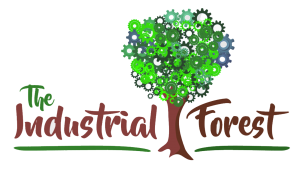
Studio Sponsor: The Industrial Forest
The Industrial Forest is a network of environmentally minded and socially conscious businesses that are using industrial innovations to build a network of sustainable forests across the United States.
Weekly Sponsor: Black Creek K-9 Pipeline Leak Detection
Disabled Veteran Owned Business in Decatur, TX. Servicing the K-9 industry with pipeline leak detection, detection services, dog training & K-9 consulting. Dwayne Farris served in the United States Marine Corps as a Military Police Officer, assigned to be a Military Working Dog Handler. Upon the honorable completion of active duty, he continued as a reservist for the U.S. Marine Corps Military Police Detachment located in Wahpeton, North Dakota as a squad leader. He was later promoted to the rank of Staff Sergeant.
As a civilian contractor, Dwayne operated for various high-profile U.S.-based security companies deployed to support Operation Enduring Freedom and Operation Iraqi Freedom. He served as a Combat Canine Tracking Handler, Trainer, Kennel Master, and Program Manager. His most recent experience was as the field-based Supervisory Subject Matter Expert working for TSA as the Regional Canine Coordinator for Region 5 based in Seattle, WA. In that position, he regionally oversaw all National Explosive Detection Canine Training Program assigned canine teams. For the Pacific Northwest area of operations, he served as a Regional Canine Training Instructor for the NEDCTP. Prior to joining the TSA, Dwayne was a Multi-Purpose Canine Trainer at Joint Base Lewis-McChord, Washington, for a special operations unit training and deploying K-9 teams in support of world-wide missions.
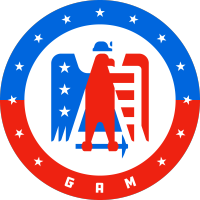
Weekly Sponsor: Great American Mining Co
Great American Mining monetizes wasted, stranded and undervalued gas throughout the oil and gas industry by using it as a power generation source for bitcoin mining. We bring the market and our expertise to the molecule. Our solutions make producers more efficient and profitable while helping to reduce flaring and venting throughout the oil and gas value chain.

Join Podcasters from across the world and all walks of life as they unite to bring civil solutions to life and liberty.

Studio Email and Inbox Sponsor: To Be Announced

Featured Music: Alma Cook
For guest, band or show topic requests, email studio@thecrudelife.com
Spread the word. Support the industry. Share the energy.

